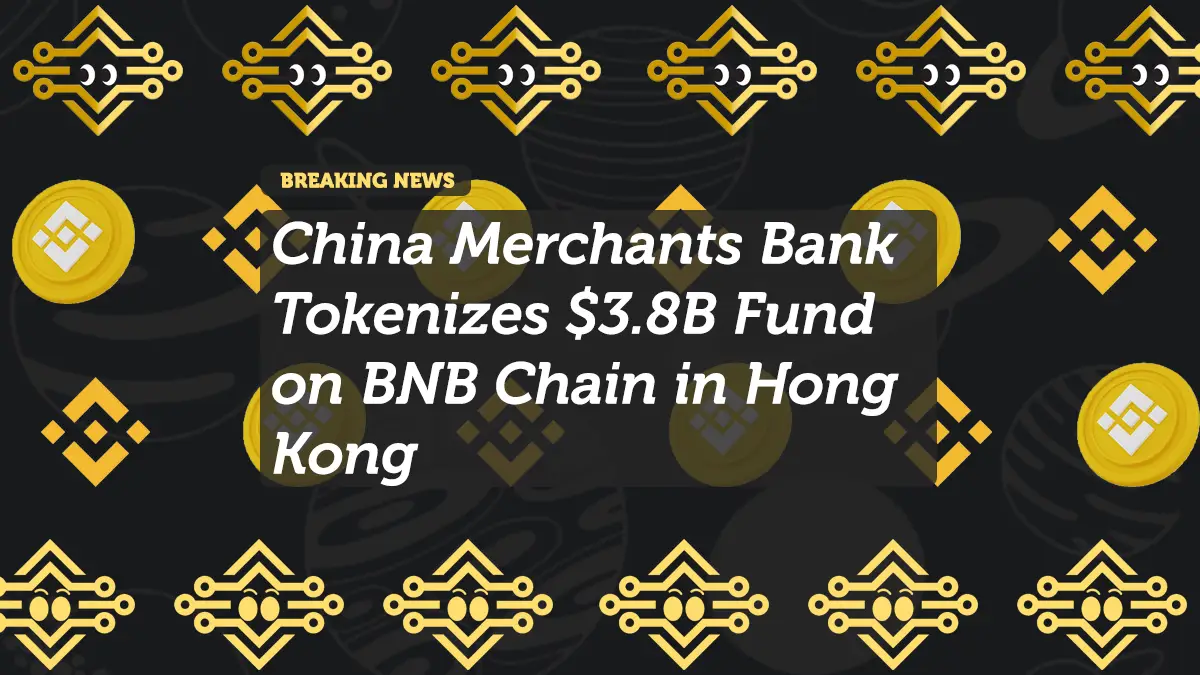
China Merchants Bank Tokenizes $3.8B Fund on BNB Chain in Hong Kong
China Merchants Bank (CMB), one of China’s largest commercial banks, has taken a groundbreaking step toward the future of blockchain-based finance.
The bank officially tokenized a $3.8 billion structured fund on the BNB Chain, leveraging decentralized technology to enhance transparency, efficiency, and global investor access.
The move represents one of the largest tokenization initiatives in Asia’s banking sector and underscores Hong Kong’s growing role as a bridge between traditional finance (TradFi) and digital assets.
A Historic Move for Institutional Tokenization
The China Merchants Bank tokenized fund marks a major leap for institutional DeFi adoption.
According to the bank’s statement, the fund — structured as a high-grade money market and bond product — was launched under Hong Kong’s regulated digital asset framework and approved by the Securities and Futures Commission (SFC).
By leveraging the BNB Chain, the project integrates blockchain’s transparency and programmability with regulated financial operations.
Each share of the fund is represented as a tokenized asset, enabling real-time tracking, settlement, and fractional ownership.
“Tokenization is the next frontier of asset management,” said Zhang Wei, Head of Digital Innovation at CMB. “This fund brings together compliance, efficiency, and accessibility — all powered by blockchain.”
Why BNB Chain?
China Merchants Bank’s decision to build on BNB Chain — Binance’s flagship Layer-1 network — highlights a growing preference for scalable, enterprise-ready public blockchains.
BNB Chain provides low-cost, high-throughput transactions and compatibility with major tokenization frameworks, making it ideal for large-scale financial instruments.
CMB also noted that the chain’s strong developer ecosystem and regulatory alignment in Asia were decisive factors.
This partnership follows BNB Chain’s expanding institutional footprint, which now includes collaborations with Fidelity Digital Assets, PwC Hong Kong, and state-backed infrastructure projects in Singapore and the UAE.
Hong Kong’s Tokenization Push Accelerates
Hong Kong has quickly become a global epicenter for regulated tokenized securities.
Following recent moves by HSBC, UBS, and HashKey Capital, the region is encouraging traditional banks to explore on-chain financial products under its Virtual Asset Service Provider (VASP) framework.
In July, the Hong Kong Monetary Authority (HKMA) launched its Project Ensemble — a sandbox for tokenized deposits and settlement systems.
CMB’s $3.8B tokenized fund launch directly aligns with these efforts, demonstrating that tokenization has moved from pilot programs to real-world deployment.
“Hong Kong is setting a precedent for how institutional tokenization can coexist with traditional regulation,” said Sarah Chan, partner at Digital Assets Asia.
BNB Chain Ecosystem Benefits
The integration of a multibillion-dollar fund further cements BNB Chain’s reputation as a hub for institutional-grade DeFi.
Following the fund’s announcement, BNB’s price climbed above $1,280, nearing a new all-time high and outperforming major peers like Ethereum and Solana.
According to DefiLlama, total value locked (TVL) on BNB Chain increased 7% week-over-week, driven by demand for staking and liquidity solutions linked to the fund.
BNB Chain’s developers confirmed that the project uses a customized version of BEP-159, enabling whitelisted institutional wallets and automated compliance checks.
Broader Implications for Asian Finance
The China Merchants Bank tokenized fund signals that Asia’s financial institutions are embracing blockchain far faster than their Western counterparts.
By moving $3.8B in assets on-chain, CMB has demonstrated both the technical readiness and regulatory maturity needed for mass tokenization.
Industry observers believe this could trigger a wave of similar products from regional banks, particularly in Singapore, Japan, and South Korea.
“Tokenized funds like this one are more than a tech experiment — they’re a structural evolution,” said Michael Sung, Chair of CarbonBlue Innovations. “Once banks see the efficiency gains, adoption becomes inevitable.”
What’s Next for CMB’s Digital Asset Strategy?
Following the tokenization of its flagship fund, China Merchants Bank reportedly plans to expand its digital strategy to include:
- Tokenized bonds and money market instruments for cross-border investors.
- On-chain identity and compliance solutions integrated with the HKMA’s regulatory sandbox.
- Stablecoin-denominated settlement systems for institutional clients.
CMB’s digital asset division is also rumored to be collaborating with Binance Institutional to build a dedicated custody and trading layer for tokenized securities.
Key Takeaways
- China Merchants Bank tokenized a $3.8B fund on BNB Chain under Hong Kong’s SFC framework.
- The project bridges traditional banking and blockchain-based finance.
- Hong Kong continues to lead Asia’s tokenization revolution.
- BNB Chain strengthens its role as a compliant, institutional-grade ecosystem.
- This marks one of the largest tokenized funds in Asia to date.
Final Thoughts
The tokenization of a $3.8 billion fund by China Merchants Bank represents a major validation of blockchain’s real-world utility.
While crypto markets remain volatile, institutional adoption continues to advance quietly — and decisively.
As banks like CMB merge traditional finance with Web3 innovation, BNB Chain’s role as the foundation for next-generation financial infrastructure has never looked stronger.
















